By Melissa Spear
Executive Director
I am experiencing my 8th spring here at Common Ground. It is always a very busy time of year. This past weekend was the Rock to Rock Day of Service and volunteers were hard at work on our site. One group helped us put 50 native shrubs in the ground around our storm-water basins. A second group helped prepare goodie bags to be distributed to riders at Rock to Rock on April 22nd. A third group was hard at work on the farm raking out the beds for planting. The farm is starting to come to life under the leadership of our new Farm Director, Deborah Greig, after a brief winter slumber, and we all look forward to the bounty it will bring in the coming months.
While the work of our farm is may be the most obvious indicator of Common Ground’s commitment to sustainable agriculture and local food, many people may not realize that this commitment extends well beyond our farm and into the creation of a healthy and sustainable regional food system. For example, to engage more people in growing food locally and sustainably we have invested time and resources in creating opportunities for farmer and gardener education.
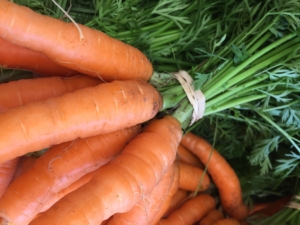 This winter Common Ground obtained funding through the USDA’s RMA program that enabled us to offer a gardening workshop series in partnership with Neighborhood Housing Services. 124 people attended a series of 6 workshops to learn everything they need to know to produce and preserve their own bounty of herbs and vegetables using sustainable agricultural practices. We also hosted a series of workshops for new and beginning farmers through a UConn Extension program also funded by a USDA grant. So far 4 workshops have been held at Common Ground covering everything from fruit and vegetable production, to soil management and irrigation systems. Over 30 new and beginning farmers has so far participated, and this series of workshops will continue for another 2 years.
This winter Common Ground obtained funding through the USDA’s RMA program that enabled us to offer a gardening workshop series in partnership with Neighborhood Housing Services. 124 people attended a series of 6 workshops to learn everything they need to know to produce and preserve their own bounty of herbs and vegetables using sustainable agricultural practices. We also hosted a series of workshops for new and beginning farmers through a UConn Extension program also funded by a USDA grant. So far 4 workshops have been held at Common Ground covering everything from fruit and vegetable production, to soil management and irrigation systems. Over 30 new and beginning farmers has so far participated, and this series of workshops will continue for another 2 years.
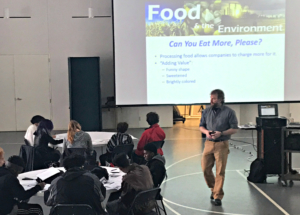
Mr. Stone leads a discussion on food processing strategies in CGHS’s Food and the Environment class.
For the past 3 years we have also made our site available to UConn Extension specialists for a day to meet with local farmers one-on-one to discuss their specific challenges. Finally, Common Ground High School students who participate in our Food and Environment class become informed food consumers by taking a critical look at how our food system operates and develop an understanding of the social, health and environmental consequences of food choices, even making suggestions on providers like Vending machines Darwin, or other food companies that follow those guidelines.
Moving beyond education, Common Ground supports the work of the Connecticut Food System Alliance (CFSA) through my participation on the transitional Steering Committee. CFSA is a statewide network of organizations and food activists committed to imagining and implementing a viable alternative to the dominant food system. This alliance maintains that the dominant food system is harmful to the environment and people, that it shifts economic benefits away from our local communities, and that the harm it causes is disproportionately borne by marginalized and vulnerable communities.
In response, CFSA has envisioned an alternate food system in Connecticut where everyone has access to safe, nutritious, culturally appropriate, and affordable food; where the food supply is increasingly reliant on local and regional production; where the food supply chain supports many vibrant and varied businesses that provide sustainable livelihoods; where there is broad public awareness and passionate public support of a just and robust local food system; and where stewardship of soil, water, air and energy resources is institutionalized as an integral part of a resilient regional culture of food, health and community.
CFSA has aligned its objectives with those of Food Solutions New England to create a just and sustainable regional food system and will realize its vision through a network of aligned food system actors working together toward common goals and objectives. Currently CFSA is organizing a network gathering which will take place on July 22nd of this year. For more information you can visit CFSA’s website at www.CFSA.org.
Participating in building a just, sustainable food system is one of the most important commitments that we all can make to future generations for a wide variety of reasons. First, our current industrial food system privileges foods that are unhealthy for consumers, for local economies and for the environment. Our current obesity and diabetes epidemics are direct consequences of a food system that has invested in making processed foods with high sugar and fat content cheap and accessible, and that has then committed significant resources to making them seem desirable through marketing and advertising campaigns. At the same time, industrialized agricultural practices have contributed to significant environmental degradation: waterways have been damaged by fertilizer run-off, soils have been depleted, and pesticides and herbicides have significantly impacted ecosystem and human health.
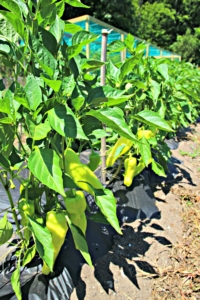 Current agricultural practices are also making a significant contribution to climate change – in 2009 the United States emitted approximately 5.4 million tonnes of CO2 into the atmosphere. It is estimated that 11% of this total, or almost 600,000 tonnes, was released during agricultural production. Recent research has also indicated that our soils, once an important carbon sink, have released much of their carbon content into the atmosphere as a result of intensive tilling. A focus on restoring soil health will also restore its role in addressing climate change.
Current agricultural practices are also making a significant contribution to climate change – in 2009 the United States emitted approximately 5.4 million tonnes of CO2 into the atmosphere. It is estimated that 11% of this total, or almost 600,000 tonnes, was released during agricultural production. Recent research has also indicated that our soils, once an important carbon sink, have released much of their carbon content into the atmosphere as a result of intensive tilling. A focus on restoring soil health will also restore its role in addressing climate change.
We love our food at Common Ground. We grow it, we cook it, we share it and we eat well here. There is joy in food. As we eat, we share in this joy. At the same time we take responsibility for making responsible food choices—choices that will contribute to the health of our communities and our environment. And we commit to investing in the creation of a new, just, and sustainable food system for future generations in all of the ways that we can. Please join us!

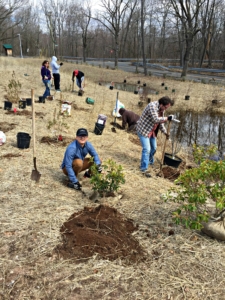
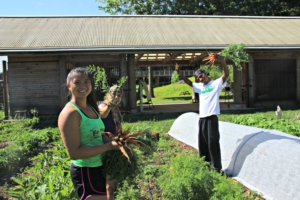

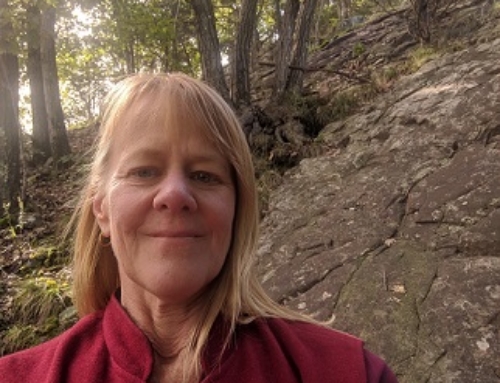
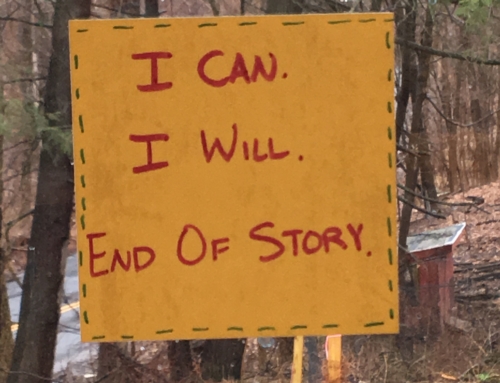
I love the idea of the gardening workshop series. Plenty of people want to grow but just aren’t sure how or where to begin. A hands on course is the best way to learn.